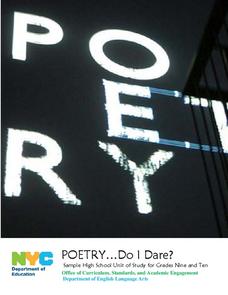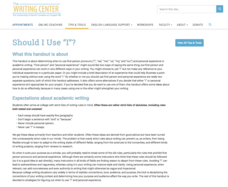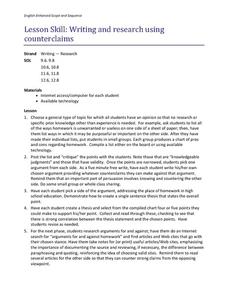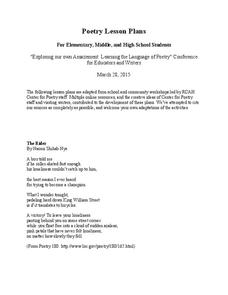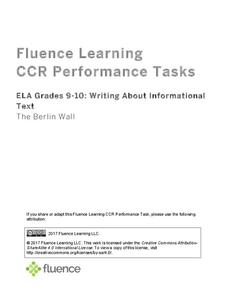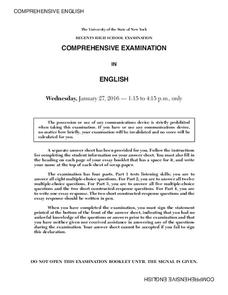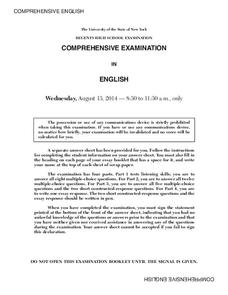Curated OER
"Shooting An Elephant": George Orwell's Essay on His Life in Burma
High school readers examine George Orwell's essay "Shooting an Elephant" for examples of symbolism, metaphor, connotation, and irony. They analyze how these literary tools convey the writer's main point and contribute to the persuasive...
Maryland Department of Education
The Concept of Diversity in World Literature Lesson 8: Nonfiction Close Reading
As part of their study of Things Fall Apart, class members conduct a close reading of a section of Chinua Achebe's essay, "An Image of Africa: Racism in Conrad's Heart of Darkness." Jigsaw groups then compare the voice in the essay...
Curated OER
Revising Pronouns and Antecedents
Students choose better pronouns to use in their writing. In this pronouns in writing lesson plan, students identify pronouns in their writing, then replace second person pronouns to improve their writing.
New York City Department of Education
Poetry…Do I Dare?
Whether you're considering a poetry unit or just want to incorporate more poetry in your curriculum, this unit plan is a must-have. Packed with poems, teaching points, powerful prompts, and poetry performance suggestions, the resource is...
University of North Carolina
Should I Use “I”?
Despite the formal nature of academic writing, personal pronouns frequently appear in high school and college papers. While your first instinct may be to cross them out, sometimes it's okay to use them, an idea covered in a handout that...
Virginia Department of Education
Writing and Research Using Counterclaims
Introduce your high school scholars as to how to use counterclaims in argument writing. Learners explore this skill with collaborative efforts and technology. Together they explore the pros and cons of homework and develop a thesis for...
Residential College in the Arts and Humanities
Poetry Lesson Plans
Need some ideas for poetry lessons? Check out this packet loaded with suggestions for elementary, middle, and high school writers.
RSA Group
Write About This
Looking for an easy way to encourage youngsters to write about a variety of different topics? Users simply choose an image to write about from a large selection of beautiful photographs and then compose original opinion pieces and...
Bright Hub Education
Using Evidence and Supporting Details in Writing
In expository writing, it is important to back up claims with evidence and details. Help your class to develop their writing with notes on different types of evidence. Once they have the basics down, practice with a sample thesis and...
Curated OER
What A Pair! A Cross Grade Writing Activity
What a pair! Older pupils interview younger ones and use what they learn to write a short, illustrated storybook that features the youngster as the main character. The youngster responds with a thank-you note in which they identify their...
Curated OER
Write On!
Help empower your class by learning about the editorial section of the newspaper. They will have the option to also write to a politician. The goal is to teach students how to speak-up and express their opinions on important issues....
Fluence Learning
Writing Informational Text: Lemonade Stand
Use a performance task to assess third graders' ability to read informational text. After they plan a lemonade stand business, young entrepreneurs implement that plan through informational writing. The task assumes learners can...
Fluence Learning
Writing a Narrative: How Bear Lost His Tail
After reading the first, second, and third parts of "How Bear Lost His Tail", third grade writers answer questions about the story by completing a series of options, including discussion points. Then, they begin to plan a new narrative...
Fluence Learning
Writing an Opinion: Is Pride Good or Bad?
Does pride really goeth before the fall, or can it be essential to one's development? Second graders read two of Aesop's fables that refer to pride in their morals, and write a short essay about whether pride is good or bad, based on...
Fluence Learning
Writing About Informational Text The Berlin Wall
On June 26, 1963 President John F. Kennedy delivered his famous "Ich bin ein Berliner" speech close to the Berlin Wall at the Rudolph Wilde Platz. On June 12, 1987 President Ronald Reagan Delivered his famous "Mr. Gorbachev, tear down...
Fluence Learning
Writing an Argument: The NIEHS
Should the work of the National Institute of Environmental Health Sciences be funded by the government? Middle schoolers weigh in on the status of federal funding for programs that protect the environment with three text passages and...
Fluence Learning
Writing About Informational Text: The Dred Scott Decision
Looking for a performance assessment that asks individuals to demonstrate their competency in writing about informational text? Use Frederick Douglass' essay "On the Dred Scott Decision," and an excerpt from Abraham Lincoln's 1857 speech...
Fluence Learning
Writing About Literature: Nature in the Writings of John Muir and Emily Dickinson
As an assessment of their skill in crafting a compare and contrast essay, class members read and compare the portrayals of nature in excerpts from naturalist John Muir's My First Summer in the Sierra and from poet Emily Dickinson's "The...
Fluence Learning
Writing About Literature: Comparing and Contrasting Characters in Heidi
Scholars read excerpts from the story, Heidi, in a three-part assessment that focuses on comparing and contrasting characters. Each part contains three tasks that challenge learners to discuss, answer comprehension questions,...
New York State Education Department
Comprehensive English Examination: June 2015
Heroes rise from adversity. That theme forms the focus of the critical lens essay in a sample comprehensive English examination. The exam, which is part of a larger series of sample standardized tests, also includes two short response...
New York State Education Department
Comprehensive English Examination: January 2016
Poetry and prose often have more in common than it initially appears. A sample comprehensive English exam has test-takers compare and contrast two passages to answer short response questions. The exam, which is part of a larger set of...
New York State Education Department
Comprehensive English Examination: August 2014
Just like with any skill, test-taking aptitude improves with practice. Learners complete the handout, answering reading comprehension questions and engaging in timed writing exercises. The test includes multiple-choice and constructed...
New York State Education Department
Comprehensive English Examination: June 2013
Tired of having to create your own formative assessments? Use a ready-made resource to assess listening and reading comprehension, essay writing, and literary skills. Scholars work through 28 questions in response to five different texts.
New York State Education Department
Comprehensive English Examination: January 2015
Looking for practice for state standardized testing? Scholars work through a variety of passages and multiple question types in this exam. Questions range from comprehension of auditory passages, reading passages, and poems, as well as...





